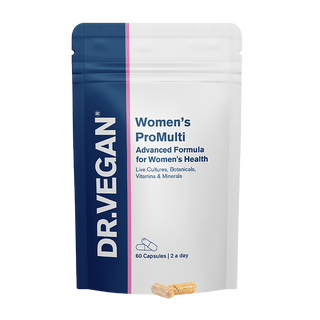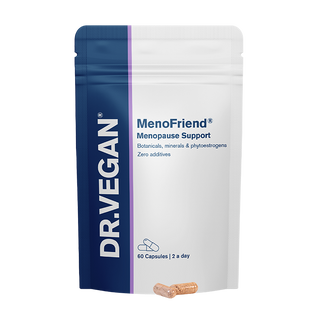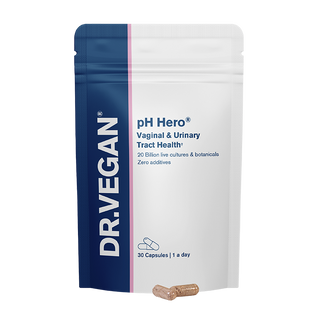Postmenopausal sex drive

The menopause life phase is a demanding time for women, both mentally and physically. These demands combined with the hormonal changes that occur may interfere with sexual health and libido. Our customer survey of 1,526 women revealed that 63% of women experienced a low libido as a key symptom of menopause*. Shona Wilkinson explains how a sex drive might change after menopause.
Sex drive after menopause
Menopause is marked by a drop in oestrogen and progesterone. The drop in these sex hormones triggers many physical changes that can impact libido. For some women, sex drive decreases due to discomfort that may occur due to the drying out and the thinning of the vaginal tissues. Hormonal imbalances may also put you on a mental rollercoaster, which isn't necessarily a good thing for a sex drive. Other women may notice an increase in sexual desire as they age, no longer feeling the need to worry about pregnancy and enjoying more freedom to focus on their intimate relationships. Studies show that more than 40% of women see a decrease in their sex drive within a few years of the menopause. You may also enjoy '8 unusual symptoms of menopause'.
However, menopause doesn't have to mean the end of sexual fulfilment, as there are many ways to enhance desire and enjoyment in this phase of life.
Low sex drive postmenopause
During menopause, oestrogen and testosterone levels decrease, which can reduce sexual arousal, desire as well as overall sexual function.
Lower oestrogen
The drop in oestrogen impacts the function of the vaginal tissues, leading to dryness or discomfort during intercourse called dyspareunia. There are many oestrogen receptors in the vagina which, when stimulated with oestrogen, trigger lubrication and moisturisation and stimulate the cells that line the vagina. When this hormone is missing or in low supply, the vaginal tissues do not get stimulated and as a result, become dry and less integral.
Lower testosterone
Testosterone is the main hormone that stimulates sex drive. Women do produce a low level of testosterone however this level is decreased at menopause. The sudden drop reduces sex drive. Testosterone is directly linked to the brain's regulation of sexual desire. It stimulates areas of the brain responsible for sexual thoughts and behaviours, leading to increased interest in sex. Testosterone also increases the sensitivity of the genital area, making physical touch and sexual stimulation feel more pleasurable.
Do all women lose their sex drive postmenopause?
No, not all women lose their sex drive postmenopause. The experience is highly individual, and while many women may see a reduction in libido, others experience no change or even an increase in desire. Relationship quality, physical health, and mental wellbeing play important roles in female libido. Women in stable, satisfying relationships often report a better sexual response postmenopause compared to those experiencing relationship strain. Menopause doesn't need to mark the end of a woman's sexual health journey; it can simply be a transition that requires new approaches to maintain it.
Women's ProMulti

Common issues with sex drive postmenopause
Many women face specific challenges that can impact sexual desire after menopause. Below are the common issues and their underlying causes:
Postmenopause sexual discomfort
Post menopause sexual discomfort is one big factor in the frequency and enjoyment of sex. This is caused by a drop in oestrogen and there are ways of managing it. Some women find HRT pessaries beneficial, so do talk to your doctor if you think this might be right for you. Keeping your vagina lubricated during sex, and the rest of the time can also be a game changer for vaginal comfort. Select natural moisturisers and lubricants, without unnecessary chemicals or additives, wherever possible.
Low libido
The combination of lowered levels of testosterone and oestrogen may trigger reduced libido. Likewise, the discomfort from vaginal dryness can create a psychological barrier to sexual desire.
Vaginal dryness
Vaginal dryness is a common issue due to the drop in oestrogen and can make sex uncomfortable or painful which has a negative impact on interest in sexual activity. Research has demonstrated the importance of taking probiotics for vaginal moisturisation. Certain probiotics find their way to the vagina where they produce a substance called 'short-chain-fatty-acids' which provide moisturisation and nourishes vaginal tissues. You may also be interested in reading 'what is vaginal atrophy?'.
Will sex drive return postmenopause?
For many women, yes, sex drive can return postmenopause. While the initial hormonal changes may cause a dip in libido, once these changes stabilise and with the right approach, many women report improved or sustained sexual desire. Women who actively address physical discomforts, such as vaginal dryness, and focus on emotional and relational intimacy often find that their sex drive improves.
How to increase sex drive postmenopause
There are several ways women can increase their sex drive after menopause:
Lifestyle changes
Regular physical activity, maintaining a healthy weight, and reducing stress can help improve sexual health. Exercise enhances circulation, including to the genital area, and improves overall energy levels.
Therapy and counselling
Addressing emotional and psychological barriers to intimacy through counselling can be highly beneficial. Couples therapy is a good way to improve the communication and connection between you and your partner which is vital for sexual desire.
Medical treatments
HRT may help address low libido. Speak to your doctor to discuss the best course of HRT if you feel it is suitable for you. You may also enjoy reading 'Is menopause over-medicalised?'.
Mindfulness and relaxation
Try reducing anxiety and stress through meditation, deep breathing, or yoga to help you feel more relaxed and open to intimacy. Regular meditation rewires the brain for a calmer you. In fact, research has proven regular meditation to improve the mental states of menopausal women.
MenoFriend®

Postmenopausal supplements
Here are some supplements which you may find helpful for improving sex drive postmenopause.
Phytoestrogens from red clover
Red clover contains phytoestrogens, which help maintain vaginal moisture and elasticity, reducing vaginal dryness and discomfort that often affect sexual function in postmenopausal women. Its oestrogen-like effects also support the health of vaginal tissues, which can improve sexual sensation and comfort during intercourse.
Maca root
Maca may have a positive impact on sexual desire and libido, making it great for menopausal women. It boosts energy and enhances mood, both essential for a healthy sex drive. Maca also supports hormonal balance, which can help restore sexual function and improve satisfaction during intercourse by combating issues like fatigue and low libido.
Dong quai
Dong Quai may improve sexual function by promoting healthy blood circulation of the vaginal tissues which is essential for sexual arousal and sensation. It has a mild oestrogenic effect which may help relieve vaginal dryness and discomfort, making sex more pleasurable. Dong Quai may also help address symptoms like hot flushes and mood swings, indirectly supporting a healthy libido by helping women feel more comfortable and emotionally balanced during menopause.
B vitamins
B vitamins, particularly vitamin B6 and vitamin B12 are needed for energy production, mood regulation, and hormone balance—all of which directly impact sexual function during menopause. B vitamins are needed for the production of the neurotransmitters 'serotonin' and 'dopamine' which help to reduce anxiety, depression, and irritability, which can all otherwise lower libido. B vitamins also help to decrease fatigue, allowing for more energy for sexual activity.
Conclusion
While some women may experience a drop in libido postmenopause, other women find ways to maintain or even enhance their sexual health.
Discover our Menopause Hub, it includes resources to help support women through all stages of the menopause.
*UK survey based on responses from 1,526 women, nationally representative, during January 2024.
You may also enjoy reading:
- What is postmenopause
- Does postmenopause cause weight gain?
- Nutrition after menopause: What your body needs now
- Joint pain and postmenopause: what’s really going on and what can help
- Protein and postmenopause: Why it matters more than ever
- Menopause in the workplace: what are your employee rights?
- Best changes in diet during menopause

















